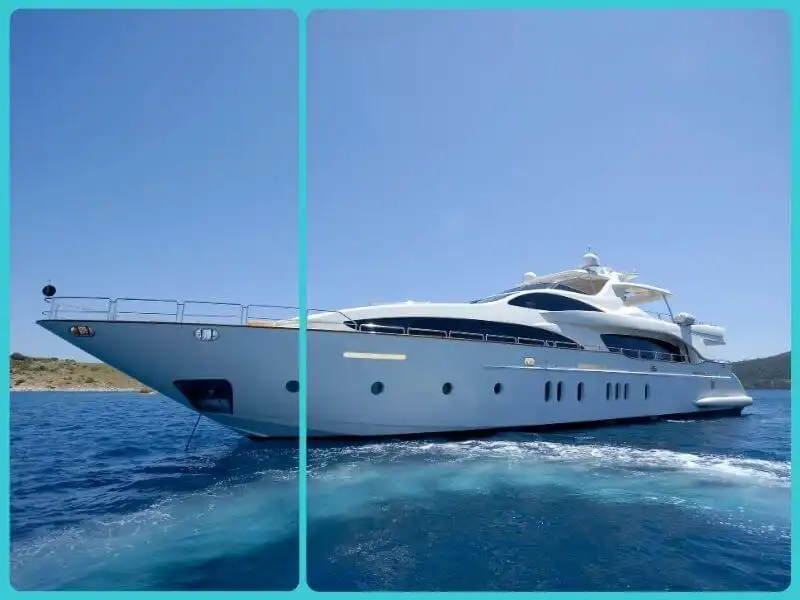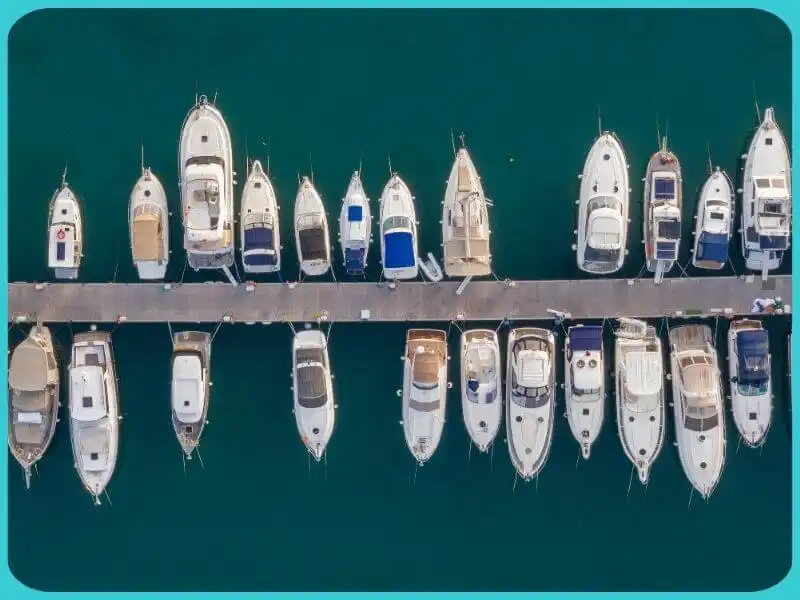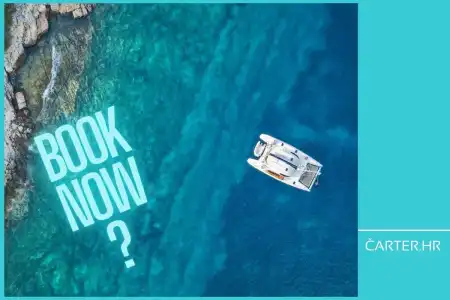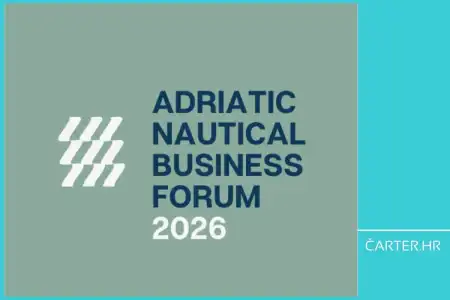
- 17.03.2025.
- News, Management, Finances
Maintaining vessels can be expensive. Or a smart investment. What if you could prevent malfunctions in time? Digital tools, proper planning, and a systematic maintenance approach enable more efficient fleet operation, leading to lower costs and greater reliability. Find out how to optimize your workflows and save money without compromising service quality.
Preventive vessel maintenance. You either do it or you don’t. If you do, skip this part. But if you don’t...
You already know that fixing breakdowns in the middle of the season is far more expensive than preventing them on time.
And a technical problem during sailing? A nightmare for you, and even more for your guests. On top of that, it brings significantly higher costs due to emergency interventions, more expensive parts, and potential canceled reservations.
Preventive maintenance doesn’t just mean occasionally checking the engine or cleaning the hull. A systematic approach is necessary; regular inspections, precise record-keeping, and technological solutions that can even predict potential problems.
Examples of steps that can reduce costs in the long run:
- Regular impeller replacement – Prevents engine overheating and the cost of replacing the entire cooling system.
- Oil and filter checks – Contaminants in the oil can damage the engine, while the cost of replacement is incomparably lower than repairing pistons or turbochargers.
- Anode inspection – Electrolytic corrosion can destroy the propeller and shaft, while the cost of new anodes is minimal compared to major damage costs.
- Steering mechanism inspection – Early signs of wear (cracks, play in joints) can prevent major failures that would require hauling the vessel onto dry dock.
- Hydraulic system servicing – Winches, hoists, and steering systems are often neglected, and their failure... A much, much bigger problem, such as deck and mooring damage.
This brings us to the question: how do modern tools help in preventing breakdowns?
Use digital maintenance tracking systems, such as software that reminds you of services and logs all repairs.
With the help of such tools, you can:
- Plan services in advance based on engine operating hours instead of randomly or by memory.
- Track spare parts consumption to always have what you need on hand.
- Receive automatic notifications about potential problems (e.g., battery voltage drop, faulty sensor, etc.).
Smart planning and resource optimization
A day lost due to a technical problem has far greater consequences - a lost reservation, angry guests...
Good planning directly impacts profitability. For fleets with ten or more vessels, every unplanned intervention means repair costs, potential compensation for guests, inconvenience, and a damaged company reputation.
How to properly organize fleet maintenance?
One of the most important steps in cost optimization is planning all technical interventions in advance.
This includes defining an annual service schedule, properly managing resources, and efficiently utilizing human and material capacities.
A question that often divides yacht charter companies: Have in-house mechanics or use external services? Here’s how the calculation looks:
In-house mechanic or technician
- Available immediately, no waiting time
- Works exclusively on your fleet
- Knows the condition of the vessels better, allowing early problem detection
- Initial investment in salary and tools can pay off in the first season
- Ideal solution for companies with more than five vessels
External services
- A better choice for complex repairs requiring specialized tools
- Can be more expensive and depends on service availability during the season
- Sometimes, waiting for an available appointment can take days, which may result in lost reservations
- Suitable for smaller fleets that do not have constant maintenance needs

Storage of spare parts – when and what to buy?
Many make the mistake of waiting to purchase spare parts until the moment they need them.
At that point, prices tend to be higher, and suppliers are overwhelmed with orders, especially during the season. A better option is to purchase in advance, during winter, when prices are lower, and services are more available.
What should always be in stock?
- Impellers, fuel, and oil filters
- Timing belts and V-belts
- Anodes for corrosion protection
- Fuses, batteries, and electric pumps
- Ropes, fenders, and spare parts for winches

Optimization of fuel consumption – every liter counts
Fuel is one of the largest variable costs in the yacht charter industry, and its consumption depends not only on the engine but also on navigation style, vessel load, and hull condition.
It is often overlooked that the way a vessel is operated can reduce or increase fuel consumption by 20% or more.
How to reduce consumption without losing performance?
- Proper navigation and selecting the optimal speed
One of the most common mistakes is running the engine at unnecessarily high RPMs. Most engines have an optimal operating range where they achieve the best fuel-to-power ratio. For most marine diesel engines, this range is between 60-75% of maximum RPMs. Sailing at higher RPMs exponentially increases fuel consumption without significant speed gains. - Avoiding sudden accelerations and unnecessary idling
Just like with cars, frequent and abrupt speed changes increase costs.
A stable, steady speed reduces engine strain and lowers consumption. Additionally, keeping the engine running unnecessarily, at anchor or in the marina, leads to avoidable losses. - Proper hull and propeller maintenance
Accumulation of barnacles, algae, and other marine organisms on the hull and propeller creates additional water resistance. Even a layer of deposits just a few millimeters thick can increase fuel consumption by up to 10%. Regular cleaning of the underwater part of the vessel, as well as applying high-quality antifouling coatings, improves hydrodynamics and reduces costs. - Correct propeller selection
A propeller that is not properly sized for the vessel can significantly increase consumption. A propeller that is too large or too small reduces the efficiency of power transfer from the engine, meaning more fuel is used for the same result. Checking the pitch and size of the propeller can bring substantial savings. - Balancing the vessel and cargo distribution
Improper weight distribution on the vessel can increase resistance and fuel consumption. Vessels with too much weight at the stern struggle to rise on waves, resulting in higher RPMs and greater consumption. Simple adjustments in the distribution of equipment and cargo can optimize stability and reduce engine load. - Using sails on sailboats
Sailboats used in charter often rely solely on their engine, even though, with minimal effort, they could use the wind for significant savings. Even in light winds, hoisting the sails can help maintain stability and reduce fuel consumption. - Software and sensors for monitoring consumption
Modern systems allow real-time fuel consumption tracking, analyzing speed, RPM, and engine load. Some software solutions can even suggest optimal navigation parameters for lower consumption.
Quality spare parts – long-term savings
There is a saying: "I am not rich enough to buy cheap things."
This statement is especially true in the yacht charter industry, where the reliability of a vessel is directly linked to the quality of the parts used.
Many try to cut costs by choosing cheaper, non-original parts, but this results in more frequent breakdowns and higher repair costs.
When a vessel is out of service due to a failure, it is not just time that is lost, but also money – from canceled reservations to expensive emergency interventions.
How to avoid costly mistakes when purchasing parts:
- Buy from verified suppliers – Genuine original parts come with serial numbers and certificates. Purchasing from unverified sources can result in low-quality copies.
- Compare prices, but do not compromise on quality – If the price of a part seems too good to be true, it usually means it is an inferior product.
- Plan purchases in advance – Quality parts are often available at better prices outside of the season, while last-minute purchases during the summer months can be twice as expensive.
- Track lifespan and learn from past failures – Keeping records of used parts and their durability helps in selecting the best options for future replacements.

Digitalization and automation – technology that works for you
Digitalization in the nautical industry has become essential for anyone looking to reduce costs and increase efficiency. Implementing software tools enables more precise maintenance planning, reduces human errors, and allows for faster detection of potential failures.
Using smart solutions allows for quicker response times and better service organization.
How do digital tools help in vessel maintenance?
- Automated service tracking – Instead of manual record-keeping or relying on estimates, software sends notifications about required services based on engine operating hours, time elapsed since the last service, or data analysis from vessel sensors.
- Digital record of all interventions – Keeping an accurate history of repairs allows for faster problem diagnosis and helps avoid unnecessary work.
- Cost comparison per vessel – Data analysis helps identify vessels generating higher maintenance costs, allowing for timely planning of replacements or improvements.
- Spare parts inventory management – Software enables tracking of stock levels and automatically suggests orders before shortages occur.
In addition to software solutions, smart sensors that monitor the condition of vital vessel systems are being increasingly used. These devices provide continuous monitoring and send alerts in case of deviations from normal values.
- Oil pressure and cooling system sensors – Can detect issues before overheating or engine damage occurs.
- Smart batteries and electrical monitoring systems – Allow precise tracking of consumption and timely battery replacement before failure.
- Fuel monitoring systems – Analyze consumption and detect irregularities that may indicate leaks or inefficient engine use.
- Automatic safety systems – Some vessels now have systems that automatically shut down the engine in the event of a critical failure, reducing the risk of major damage.
How to implement digitalization without (too) large investments?
- Start with digital record-keeping
- Gradually introduce software solutions
- Invest in basic sensors
- Educate staff (and skippers)

A smart fleet is a profitable fleet
Managing vessel maintenance costs in the yacht charter industry is also a strategic decision that determines business profitability.
Yacht charter companies that plan maintenance on time, use quality parts, and apply modern technologies not only reduce costs but also create a reliable and profitable operating system.
The greatest savings come from long-term thinking, not short-term cost-cutting.
Automation and digitalization are no longer just tools for large yacht charter companies.
Engine monitoring sensors, fuel management systems, and fleet management software are now available to smaller operators, and those who use them achieve significant savings and easier maintenance organization.
Proper planning and the smart use of technology are not a luxury but something that can make an entire business sustainably stable in the long run.
Vessel maintenance should not be a passive process where problems are only addressed once they become critical. A properly maintained fleet is not only cheaper to manage but also more reliable, safer, and more profitable in the long term.
Are you ready to implement cost optimization strategies that will increase your profitability without sacrificing service quality?
Explore our digital tools, send us an inquiry, and create a system where vessels work more while costs remain lower.
Categories of trends
- News
- Sale
- Marketing
- SEO
- Web design
- Social media
- Technology
- Regulations
- Management
- Education
- Finances
- User experience
Newsletter
Sign up for the newsletter and receive the latest trends and tips straight to your inbox





